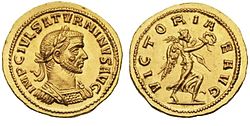| Julius Saturninus | |||||||||
|---|---|---|---|---|---|---|---|---|---|
| Usurper of the Roman Empire | |||||||||
 | |||||||||
| Reign | 280 | ||||||||
| Born | Africa | ||||||||
| Died | 280 Palestine | ||||||||
| |||||||||
Julius Saturninus (died 280/281 AD) was a Roman usurper against Emperor Probus. [1] [2] He was probably the same man as Gaius Julius Sallustius Saturninus Fortunatianus, legate in Numidia under Gallienus and suffect consul around 260 AD. [3] [4]
Contents
Saturninus was an African by birth (others have him as a Gaul, probably a mistake), and studied rhetoric in Africa and Rome. [2] He was a friend of Probus, who appointed him governor of Syria around 279. After Probus had left Syria for the Rhine in 280, unruly soldiers and the people of Alexandria pressured a reluctant Saturninus to accept imperial office. Having fled from Egypt, he changed his mind in Palestine and proclaimed himself emperor. Ancient sources conflict on what happened next: the Historia Augusta states that Probus sent men to kill the usurper, while according to an account by Zosimus, before Probus could respond to the threat, Saturninus was dead, killed by his own troops. [5]